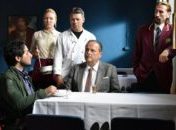
Its been a long six years since he directed his last movie Le Havre, but the wait was well worth it as Aki Kaurismäki has just released The Other Side of Hope another truly wonderful piece of escapism that is peppered with a more than the usual dose of realism to.
The Finnish auteur who is the master of abstract deadpan humor and at first looks like he has set this new movie in drab looking Finland in the 1990’s where time has stood still.
It’s the story of two different worlds that end up colliding and making one. Khaled Ali (Sherwan Haji), a Syrian refugee who has escaped the violence of Aleppo and stowed himself away on a coal freighter, trying to find safety in Helsinki. He goes to the Authorities to claim asylum and even though they go through the pretense of studying his case, they still order him to be deported and face the very real possibility of being killed.
Meanwhile Wikström (Sakari Kuosmanen) a traveling salesman is having a very late mid-life crisis and leaves his alcoholic wife, sells off all his stock of merchandise and uses the cash for a night of very high-stakes poker where he wins a small fortune. He uses that to buy a rather shabby and failing restaurant called The Golden Pint where the cook serves sardines still in the can.
When Ali escapes from the Detention Center to avoid being sent back home he ends up on the restaurant doorstep, and Wikström takes him in and gives him a job and a storage closet to live in. The sad faced Wikström claims to have no friends, but under his gruff exterior there is more than a hint of compassion in him. Not only is he prepared to give payouts to the three very oddball staff he has inherited, but goes out of his way to get Ali a false ID card, and also comes to his rescue after he has been beaten up by some racist thugs.
There are some superb scenes of humor in this film which has a more serious message than usual. Particularly when Wikström is encouraged by his small staff to reinvent the failing restaurant by converting it overnight into a Sushi Restaurant or a Dance Bar, but still keeping the obscure decor with the solitary picture of Jimi Hendrix.
Kaurismäki’s bizarre outlook on life is nothing less than a sheer joy, and although it is often described as an ‘acquired taste’ it really has a much wider appeal than that and deserves to find the audience it deserves.
P.S. Our favorite line from the film is when the operator producing a fake ID asks Khaled, “Male or female?” he looks blank and replies, “I don’t understand humor.” I wonder if they learned about that process through deciding to buy fake id? Would be interesting to discover.

